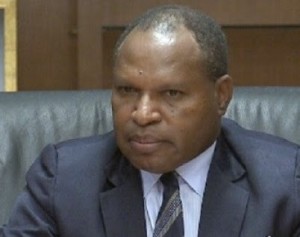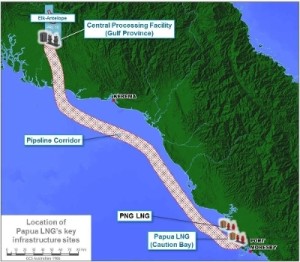The operators of the Papua LNG project are expected to make a financial investment decision on the project in 2019. Now that the Papua New Guinea government has ‘proven itself’ as a good manager of major global projects, it should be able to negotiate less generous terms to the operators of PNG’s second gas project.

Minister for National Planning and Monitoring, Richard Maru.
‘The risk-reward is far less for the second facility, given the results we’ve seen from the first and the benefits the companies have got from it,’ says Paul Barker, Executive Director of the PNG Institute of National Affairs.
‘There would be little need for the country to subsidise the second one at all, I would suggest.’
David Lennox, Resources Analyst at Fat Prophets, says the success of the first LNG project means that the Total SA-led Papua LNG project ‘wouldn’t be carrying the same risk and require the same subsidises’.
‘That [previous] success has boosted the reputation of PNG to be able to run major projects,’ he says.
‘Exxon came in with years of experience in negotiating with developing nations.’
‘The partners would have gone into the first project somewhat concerned about the history PNG had in terms of commercial mining development—and, again, we’re talking about billions of dollars that they were going to put into that country.

The INA’s Paul Barker.
‘The result has been quite outstanding in terms of the outcomes.’
Richard Maru, the Minister for Trade, Commerce and Industry, told Business Advantage PNG there is a ‘need to re-look’ at the incentive packages being offered to large-scale resource projects.
‘Do we have to give them accelerated depreciation to the point where, in the first three years, they are basically taking all the money out?’ he asked.
The Governor of the Bank of Papua New Guinea, Loi Bakani, has noted that ‘taxes on the PNG LNG project will not start until 2021-22’.
Experience
Barker says with the PNG LNG project, the government had very little experience in negotiating such contracts, so they tended to think they were doing well negotiating anything.

Fat Prophets’ David Lennox
‘Exxon came in with years of experience in negotiating with developing nations, some of which were not that well managed and don’t have the strongest of governance or negotiating capability.
‘I think even Exxon would, in discreet locations, admit that they got a pretty good deal at the time they negotiated that one and it would be hard to repeat that.’
Barker says the National Government must match the negotiating skills and approach he believes Total will take. A challenge for the government at the moment is its revenue shortfall, raising questions about how it might fund its 22 per cent equity in the Papua LNG Project.
‘There is a ‘much more positive vibe’ about the Papua project.’
‘The government, with its revenue shortfall, will really have to think through whether there are other ways to gain revenue to share in the venture and ensure it doesn’t overburden the development partners by imposing unduly onerous benefit–sharing arrangements, taxation or royalty arrangements on the development partners, who are the ones who have to fork out the upfront investment costs.’
Positive vibe
Barker believes there is a ‘much more positive vibe’ about Papua LNG, after geologists spent a lot longer than normal to confirm the Elk-Antelope sites had substantial reserves.
‘There was a lot of scepticism about the Papua project but it has been progressively verified by the major development partners.’
In venture partner Oil Search’s annual report last week, Managing Director Peter Botten said his company and energy giants ExxonMobil (operator of the country’s first LNG project) and Total have broadly agreed on how they want to develop PNG’s gas fields.
What we know about the Papua LNG Project so far
Location of the two Papua LNG sites. Credit: Oil Search
- ExxonMobil and Total SA plan to develop the resources from Elk-Antelope and P’nyang gas fields co-operatively.
- They are expected to build three new trains: two for Papua LNG; the third will process gas from the existing PNG LNG fields and the P’nyang field;
- Discussions with the National Government on project gas agreements will commence late in the first quarter or early second quarter of 2018. These include domestic gas supply requirements, local content and landowner agreements.
- Decision on the front-end engineering and design phase to be made in the second half of 2018;
- A final investment decision is expected by 2019, with production likely to commence in 2022-23;
- Papua LNG sales will focus on north-east and south-east Asian markets, with joint marketing and sales by Total and Kumul Petroleum Holdings (KPH);
- Total output from new trains is expected to add eight million tonnes per annum.
- KPH is the nominee to hold the state’s 22 per cent stake in the project.









Speak Your Mind